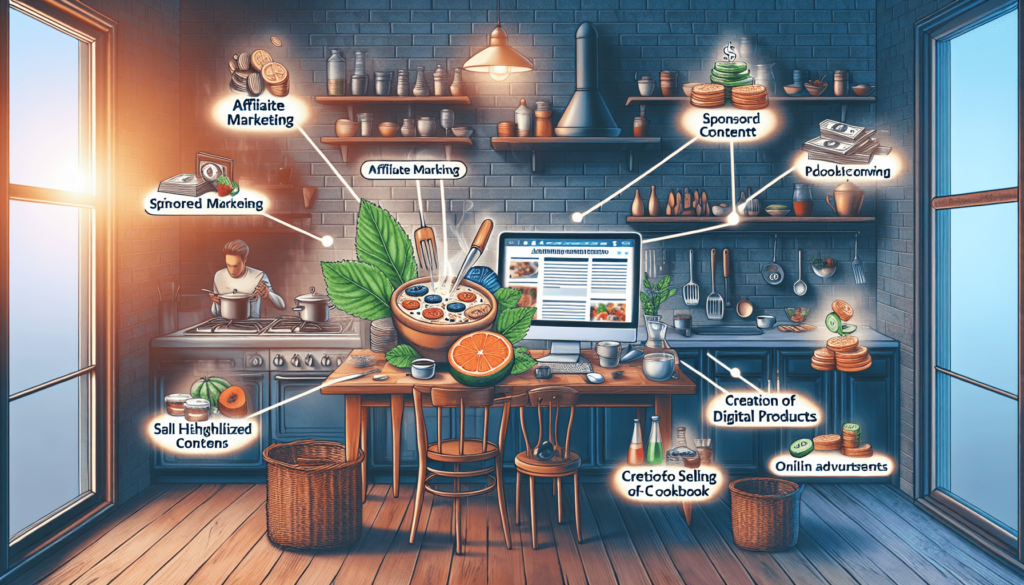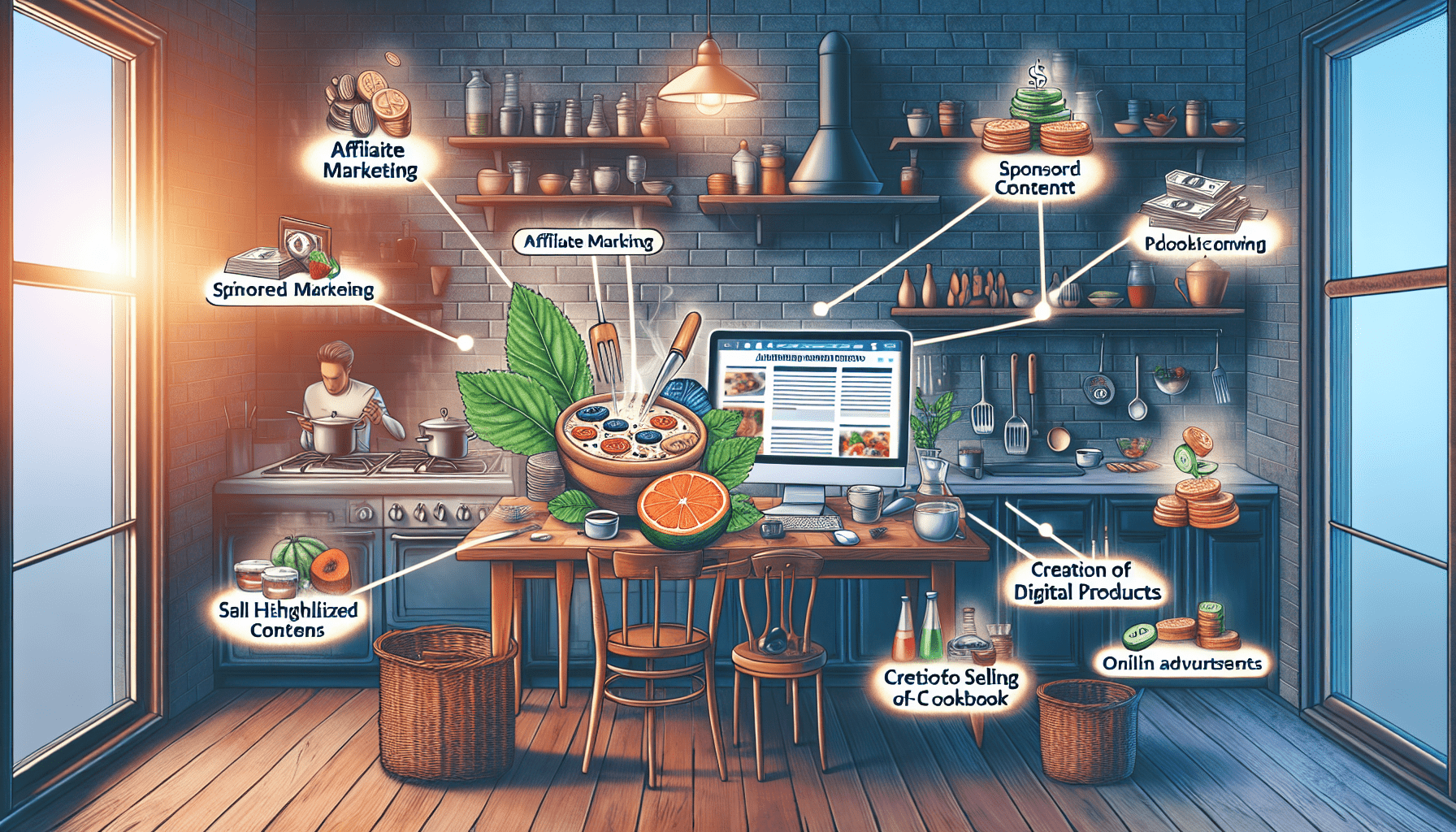In today’s digital age, online food blogs have become a popular platform for sharing culinary experiences, recipes, and food photography. However, the question that often arises is how to effectively monetize these blogs and turn a passion for food into a profitable venture. Look no further, as we bring you a comprehensive guide on the most effective strategies to capitalize on your online food blog. From partnering with brands to affiliate marketing, we will explore innovative ways to connect with your audience and maximize your blog’s profitability. Join us as we delve into the world of effective monetization strategies for online food blogs.

Unlock Earning Power: My $7 Mega Link Secret Revealed!
Sponsored Content
As food bloggers, we have the opportunity to partner with brands for sponsored blog posts. This means that we can create content that features a specific brand or product in exchange for compensation. Sponsored blog posts are a win-win for both us and the brand, as it allows us to generate income while also promoting products or services that we believe in and think our audience will love.
In addition to sponsored blog posts, we can also promote products or services through sponsored reviews. This can involve trying out a product or service and sharing our honest opinions with our audience. By partnering with brands for sponsored reviews, we not only get paid for our work, but we also provide valuable insights and recommendations to our readers.
Another great way to incorporate sponsorship into our culinary content is by including sponsored recipes or cooking tutorials. Brands can collaborate with us to develop unique recipes using their products, which we can then share with our audience. We can also create cooking tutorials in partnership with brands, showcasing how to use their products in various dishes. By including sponsored recipes or cooking tutorials, we not only generate income, but we also provide our readers with new and exciting ideas for their own culinary adventures.
Affiliate Marketing
Affiliate marketing is another effective way for us to monetize our food blog. By joining affiliate programs, we can promote relevant products that align with our blog’s niche and audience. These products can range from kitchen appliances and cookware to specialty ingredients and gourmet food items. When our readers make a purchase through one of our affiliate links, we earn a commission.
We can incorporate affiliate links within our blog posts and recipes, seamlessly weaving product recommendations into our content. For example, if we’re sharing a recipe that calls for a specific kitchen gadget, we can include an affiliate link to that gadget in our ingredient list. This allows our readers to easily purchase the product if they’re interested, while also earning us a commission.
Another effective strategy is to create product round-up posts with affiliate links. We can compile a list of our favorite kitchen tools, cookbooks, or ingredients, and provide our readers with direct links to purchase these items. This not only helps our audience discover new products, but it also generates income for us through affiliate sales.
Life-Changing: How a Simple Link Brought Me Financial Freedom!
Ad Networks
Ad networks, such as Google AdSense, offer another avenue for us to monetize our food blog. By signing up for ad networks, we can display ads within our blog posts and sidebar. These ads are typically targeted to our audience’s interests, ensuring that they see relevant advertisements.
To maximize visibility and engagement, it’s important to optimize the placement of our ads. Placing ads within our blog posts, in between paragraphs or at the end of the post, can help capture our readers’ attention. Additionally, including ads in the sidebar of our blog provides a constant presence for our audience.
While ads can be a great source of passive income, it’s important to strike a balance between monetization and user experience. We should aim to create a seamless and enjoyable reading experience for our audience, without overwhelming them with excessive ads.
Selling Digital Products
Creating and selling digital products is an excellent way to monetize our food blog while providing value to our readers. One option is to create and sell e-cookbooks or recipe collections. These digital products can be a collection of our best recipes, themed recipe books (such as “Quick and Easy Weeknight Dinners”), or specialized cookbooks catering to specific dietary needs.
Another option is to offer meal plans or cooking guides for purchase. This can involve creating weekly or monthly meal plans that include recipes, shopping lists, and tips for meal prepping and batch cooking. By offering meal plans, we not only provide convenience to our readers, but also generate income.
In addition to e-cookbooks and meal plans, we can also provide access to exclusive content for paid subscribers. This can include bonus recipes, behind-the-scenes content, or video tutorials. By offering exclusive content, we give our most dedicated readers a reason to support us financially, while also nurturing a sense of community.

Daily Payday From Your Couch? Try now for the cost of a cup of coffee!
Online Courses
For those looking to share their culinary expertise in a more interactive format, developing and offering online cooking or baking courses can be a lucrative option. These courses can be conducted through pre-recorded videos, step-by-step guides, and written materials.
By providing video tutorials and step-by-step guides, we can help our students learn new techniques, master specific recipes, or explore different cuisines. It’s important to offer personalized feedback and support for our students, ensuring that they receive individual attention and guidance throughout the course.
Offering online courses allows us to share our knowledge and passion for cooking with a wider audience, while also generating income through course enrollment fees. It’s crucial to regularly update and improve our courses based on student feedback and industry trends to provide the best learning experience.
Creating and Selling Merchandise
Creating and selling branded merchandise is a fantastic way to monetize our food blog while also promoting our personal brand. We can design and sell merchandise such as aprons, mugs, t-shirts, or even kitchen utensils that feature our blog’s logo or food-related designs.
To make our merchandise even more appealing to our audience, we can offer limited-edition or seasonal products. This creates a sense of exclusivity and urgency, encouraging our readers to make a purchase. Additionally, collaborating with other food bloggers for joint merchandise can help expand our reach and attract a larger audience.
By selling merchandise, we not only generate income, but also increase our brand visibility and recognition. Our readers can proudly showcase their love for our blog and support us while enjoying quality products related to their passion for cooking.
Shocking! This one link can pay you time and time again!
Sponsored Social Media Posts
In this digital age, social media is a powerful tool for reaching and engaging with our audience. By partnering with brands for sponsored social media posts, we can generate income while promoting products or services to our followers.
Platforms such as Instagram or Facebook offer various opportunities for sponsored posts. We can collaborate with brands to create engaging and authentic content that showcases their products in a natural way. This can involve sharing our own experiences with the product, creating beautiful recipe photos or videos featuring the product, or even hosting giveaways where our followers have a chance to win the product.
Creating engaging sponsored content on various platforms not only provides financial benefits, but also helps us grow our social media following and establish ourselves as influencers in the food blogging community.
Coaching or Consultation Services
Our experience and expertise in food blogging can be valuable to aspiring food bloggers or those looking to improve their culinary skills. By providing one-on-one coaching or personalized consultations, we can help others achieve their goals while generating income.
Aspiring food bloggers can benefit from our guidance in topics such as blog setup, content creation, photography, and branding. We can offer tailored advice and recommendations based on their individual needs and goals.
Additionally, we can offer personalized consultations for recipe development. This can involve helping individuals fine-tune their recipes, offering suggestions for ingredient substitutions or flavor combinations, and assisting in recipe testing and troubleshooting.
By providing coaching or consultation services, we not only help others succeed, but we also establish ourselves as industry experts and create additional income streams.
Unlock Earning Power: My $7 Mega Link Secret Revealed!
Collaborations and Partnerships
Collaborating with other food bloggers for joint projects can bring exciting opportunities and increased exposure for our blog. By sharing audiences and resources, we can reach a wider audience and generate additional income.
We can partner with other food bloggers to create joint content, such as recipe collections, e-books, or even virtual cooking events. This allows us to combine our expertise and creativity, providing our audience with fresh and diverse content.
Partnering with local businesses for sponsored content is another fruitful way to monetize our food blog. For example, we can collaborate with a local restaurant to create sponsored blog posts or social media content featuring their dishes or events. This not only generates income, but also helps support local businesses and strengthen community relationships.
Furthermore, joining forces with complementary brands for cross-promotion can be mutually beneficial. By partnering with a brand that shares a similar target audience but offers different products or services, we can reach new potential customers and expand our reach.
Crowdfunding and Donations
For special projects or initiatives that require additional funding, crowdfunding and accepting donations can be effective monetization strategies. Platforms like Patreon allow us to create a page where our readers can make recurring donations in exchange for exclusive content or perks.
By offering exclusive rewards or perks, such as early access to new recipes, personalized shout-outs, or access to a private community, we provide an incentive for our audience to support us financially. This not only helps us fund special projects or cover ongoing expenses, but also fosters a sense of community and gratitude among our most dedicated readers.
Additionally, launching a crowdfunding campaign for specific goals or projects can help us raise funds. Whether it’s to upgrade our kitchen equipment, attend a culinary workshop or conference, or start a new series on our blog, crowdfunding allows our audience to directly contribute to our success.
In conclusion, there are numerous effective monetization strategies for online food blogs. From sponsored content and affiliate marketing to selling digital products and offering coaching services, we have a wide range of options to generate income while providing value to our readers. By combining different strategies and finding the ones that align with our blog’s niche and audience, we can turn our passion for food into a profitable venture.
Life-Changing: How a Simple Link Brought Me Financial Freedom!

